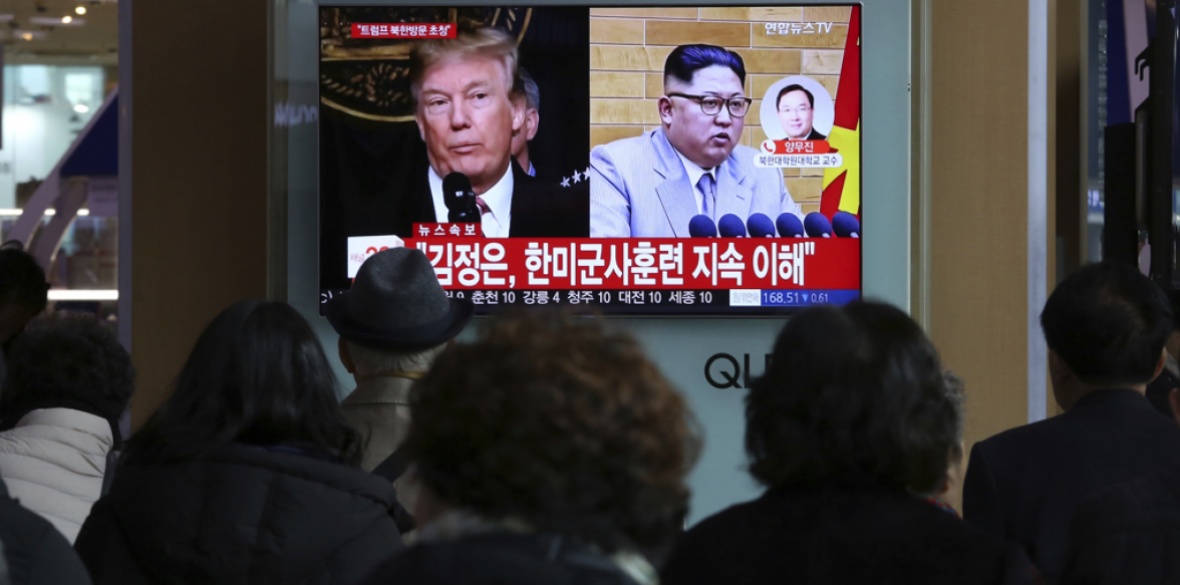This is the last article you can read this month
You can read more article this month
You can read more articles this month
Sorry your limit is up for this month
Reset on:
Please help support the Morning Star by subscribing here
NO-ONE should be carried away by the surprise announcement that Donald Trump and Kim Jong Un are to meet in the next few months, but there is no denying that it is a positive development.
Predictably, the US House foreign affairs committee claims that the talks initiative that emerged from contacts between the North Korean leader and South Korean President Moon Jae In shows that sanctions are “starting to work.”
If anything, it shows the opposite. Pyongyang has never previously conceded in the face of sanctions. Why should now be different?
In reality, what changed has been relationships on the Korean Peninsula where Moon dropped loud-hailer diplomacy in favour of quiet contacts on the basis of equality and mutual respect.
Both Korean leaders understand that their people do not want internecine warfare that would be even more devastating than the previous Korean war waged by the US and its allies, false-flagged as the United Nations, as part of Washington’s plan to “roll back communism.”
Their co-operation in the “peace” Olympics at Pyeongchang opened the way to a new bilateral approach which then involved Moon’s national security director Chung Eui Yong flying to the US to brief the Trump administration.
Keeping the approach under wraps until it was a done deal has prevented it from being shot down in mid-flight as it would have been had Congress cold warriors been able to get their claws into it before it was finalised.
Chung stressed that Kim has pledged to “refrain from any further nuclear or missile tests” prior to the meeting with Trump and that both Korean administrations seek to achieve “permanent denuclearisation” of their peninsula.
For some on Capitol Hill “denuclearisation” refers only to North Korea’s military nuclear capacity, but it must include a US commitment also not to site nuclear weapons in the South.
Similarly, Kim’s concession on halting further nuclear or missile tests must be read in the context of Washington’s obdurate insistence on carrying out extensive annual military exercises that resemble preparations for an invasion of the North.
Kim must have been persuaded by his contacts with Moon that the Trump administration is amenable to an arrangement that ratchets down the tension in the region, allowing the two Korean states to develop better relations and, in time, to reunite the Korean nation, which both declare as their goal.
Pyongyang will be open to such an arrangement but will also be cautious in light of historical precedent.
It was previously persuaded to sign an international treaty on curtailing its pursuit of nuclear capacity, which the US and its allies viewed as destabilising, on the basis of being supplied with alternative means of power by the US.
But the US reneged on this deal, making it inevitable that Pyongyang would step up its nuclear programme, including production of warheads, believing, quite justifiably, that imperialism’s history of invading states it disliked meant that North Korea was on a short list.
If those advising President Trump have moved away from their position that military invasion always remains an option, North Korea can embrace approaches not previously open to it.
The torrent of personal abuse between Kim and Trump in the past year has not been particularly edifying, but, if both men can put that behind them and push ahead to a new dawn for Korea, they will merit thanks and appreciation.
Nothing can be taken for granted, but, given the destruction and mass loss of life that Koreans suffered in the war, everyone will wish negotiators all success.












